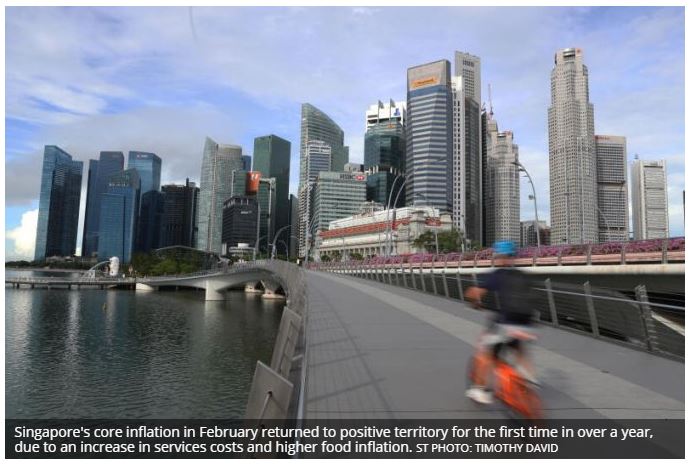Singapore core inflation turns positive after over a year, up 0.2% in February
SINGAPORE’S core inflation in February returned to positive territory for the first time after over a year, due to an increase in services costs and higher food inflation, according to a joint statement from the Monetary Authority of Singapore (MAS) and the Ministry of Trade and Industry (MTI) on Tuesday.
Core inflation, which excludes accommodation and private transport, rose 0.2 per cent year on year in February, lifting from the -0.2 per cent seen in January.
Headline inflation, which includes all items, went up to 0.7 per cent, up from 0.2 per cent in January.
This was driven by higher private transport inflation, in addition to the rise in core inflation, MAS and MTI said.
“Core inflation is forecast to be mildly positive this year, as higher oil prices lead to a pickup in electricity and gas tariffs, and the disinflationary effects of government subsidies introduced in 2020 fade,” the authorities said in the statement.
Some components of domestic services inflation are projected to continue increasing, in tandem with the economic recovery, they added.
Core inflation is tipped to average zero to 1 per cent this year, according to the authorities, while headline inflation is being reviewed given the “sharper-than-expected increase” in the prices of non-core items.
In the quarters ahead, external inflation is likely to rise amid the recovery in global oil prices, MAS and MTI said.
“Notably, Brent crude oil prices have risen further since Q4 2020, supported by output cuts among Opec+ members. However, continuing negative output gaps in Singapore’s major trading partners should cap the extent of the increase in underlying global inflation,” the authorities said.
In Singapore, cost pressures are expected to stay low, as wage growth and commercial rents are likely to remain subdued, they said.
Private transport costs rose 4.2 per cent in February, up from 1.9 per cent in January, due to a rise in car prices and a smaller decline in petrol prices.
Services costs rose 0.5 per cent, reversing the 0.3 per cent decline in January, on the back of higher inflation for tuition and other fees, as well as a smaller decline in outpatient services costs.
Food inflation inched up 1.6 per cent, from January’s 1.5 per cent, as the prices of non-cooked food registered a steeper increase, MAS and MTI said. Prices of prepared meals rose at a pace similar to that in January.
The cost of electricity and gas fell 9.8 per cent, down from 9.7 per cent in January, due to a smaller rise in gas prices. Accommodation inflation, meanwhile, remained unchanged in February, with housing rents rising at a steady pace compared with January.
The cost of retail and other goods fell 1.9 per cent, compared with January’s 1.3 per cent decline. The authorities attributed this to sharper reductions in the prices of clothing and footwear and personal effects, while the prices of medicines and health products also fell.
Source: https://www.businesstimes.com.sg/government-economy/singapore-core-inflation-turns-positive-after-over-a-year-up-02-in-february


 Thailand
Thailand




